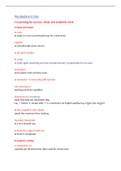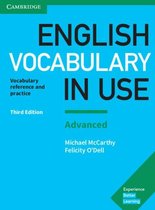Vocabulary in Use
1 Cramming for success: study and academic work
A Study and exams
to cram
to study in a very concentrated way for a short time
a genius
an exceptionally clever person
to do some revision
to revise
to study again something you have already learned, in preparation for an exam
past papers
exam papers from previous years
to memorise = to learn sthg (off) by heart
rote-learning (n)
learning purely by repetition
mnemonics (n) /nɪˈmɒn.ɪk/
tricks that help you remember sthg
e.g., ‘i’ before ‘e’ except after ‘c’ is a mnemonic for English spelling (e.g. friend, but receive)
to bury oneself in one’s books
spend the maximum time studying
(to study) intensively
in a very focused way
to know the subject inside out
to know it completely
B Academic writing
a composition (n)
could be just 50-100 words, often used for school work
,an essay (n)
longer than a composition, more serious, hundreds or thousands of words
an assignment (n)
a long essay, often part of a course, usually thousands of words
a project (n)
like an assignment, but emphasis on student’s own material and topic
a portfolio (n)
a collection of individual pieces of work; may include drawings and other examples of
creative work as well writing
a dissertation (n)
a long, research-based work, perhaps 10-15,000 words, for a degree or diploma
a thesis (n)
a very long, original, research-based work, perhaps 80-100,000 words, for a higher degree
(e.g. PhD)
a mind map (n)
diagram that lays out ideas for a topic and how they are connected to each other
a first draft (n)
first, rough version
to write up
to write something in a complete or final form using notes that you have made
plagiarism (n)
using other people’s work as if it was yours
a plagiarism form (n)
to acknowledge
to give details of
a deadline
date by which you must hand in the work
,to submit
to hand in (formal)
to assess
to evaluate and give a grade
feedback (n)
comments from the teacher/tutor
C Aspects of higher academic study
to carry out research
to do research (less formal)
academic journals (n)
magazines with academic articles (we do not use the word magazine to talk about this kind
of academic publication)
to access it online
to get hold of (it) on the internet
an inter-library loan
system where libraries exchange books/journals with one another
open educational resources (n)
online materials that can be freely used by teachers and students anywhere
to drop out
leave the course before the end
finals (n)
last exams before the end of a college or university course
well-qualified (ADJ)
with the right formal qualifications
, 2 Education: debates and issues
A Opportunity and equality
equality of opportunity
when everyone has the same chances
selective schooling (n)
pupils are chosen for entry, usually for academic reasons, though, in the case of some
private schools, parents’ ability to pay school fees may be a factor in selection
comprehensive schooling (n)
everyone enters without exams and education is free, paid for by the government
schooling (n)
education received at school
elitism (n) /iˈliː.tɪ.zəm/
when you favour a small, privileged group
to be inherent in
to exist as a basic part of sthg
league tables (n)
lists of schools or colleges, from the best down to the worst, based on exam results and,
sometimes, other criteria
to perpetuate
to make sthg continue
a two-tier system
a system with two separate levels, one of which is better than the other
to perceive
to see/consider
better-off (ADJ)
rich
well-endowed (ADJ)
receiving a lot of money in grants, gifts from rich people, etc.





